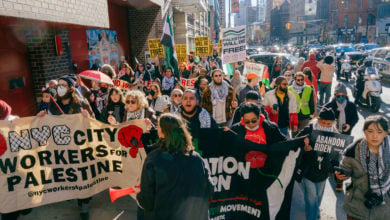Oil prices reached a record $114 dollars a barrel on April 15. The national average price per gallon of regular grade gasoline climbed to $3.50. San Francisco experienced the largest price spike in the country, topping off at $3.79 on average.
|
Workers across the country are feeling the spike at the pump daily, but the damage caused by the swelling profits of the oil industry is being felt throughout the economy.
In recent weeks, independent truckers have held protests throughout the United States showing their outrage over having to pay thousands of dollars to fill up their tanks. They caused traffic delays and displayed signs calling for federal aid to lower fuel prices.
On April 1, truckers backed up highways from New Jersey to Chicago by driving at slow speeds. Some 200 truckers protested at the New Jersey Turnpike, and four-dozen truckers held a protest in Florida near the port of Tampa. Diesel prices have reached $4 per gallon on average, after a 50 percent spike since last year.
The “strike” was largely organized via CB radios and trucking Web sites by the truckers themselves. The Teamsters and the Owner-Operator Independent Drivers Association denied having any role in the protests. (AP, April 1)
The fuel cost increase is a trend that threatens all workers. Truckers are forced to fork over thousands of dollars to big oil companies out of their own pockets; many are not going to be able to keep their jobs. Trucks delivering everyday staples to workers across the country will be taken off the road. This, as well as the rising cost of fertilizer caused by the oil price spike, has greatly driven up the prices of food and other goods.
Contrary to the myth that there is nothing the government can do to regulate gas prices, there are short-term solutions that can ease the burden on workers. The U.S. government has stepped in, in the past, to control the price of gas. Venezuela, for one, highly subsidizes the cost of fuel to make it more affordable.
However, the U.S. government’s sole purpose is to represent the interests of the capitalist ruling class, which is deeply invested both directly and indirectly in the oil industry. Washington has waged a multi-billion-dollar war on Iraq in an attempt to secure the region’s petroleum resources.
In 2007 alone, the top five biggest oil companies made $123.3 billion, with Exxon leading the pack with $40 billion—the highest corporate profits in U.S. history.
Washington may still need to act to protect major corporations if energy prices continue to spiral out control—some, such as major airlines, are already feeling the sting. However, politicians will not intervene to protect the working class on their own accord. For that, workers will have to wage a fierce, determined struggle.
While we must fight for these short-terms solutions, ultimately only a planned economy free of the profit motive can end the fleecing of working people by oil corporations. Only when we do away with the profit system can we set about meeting the needs of the working class.







